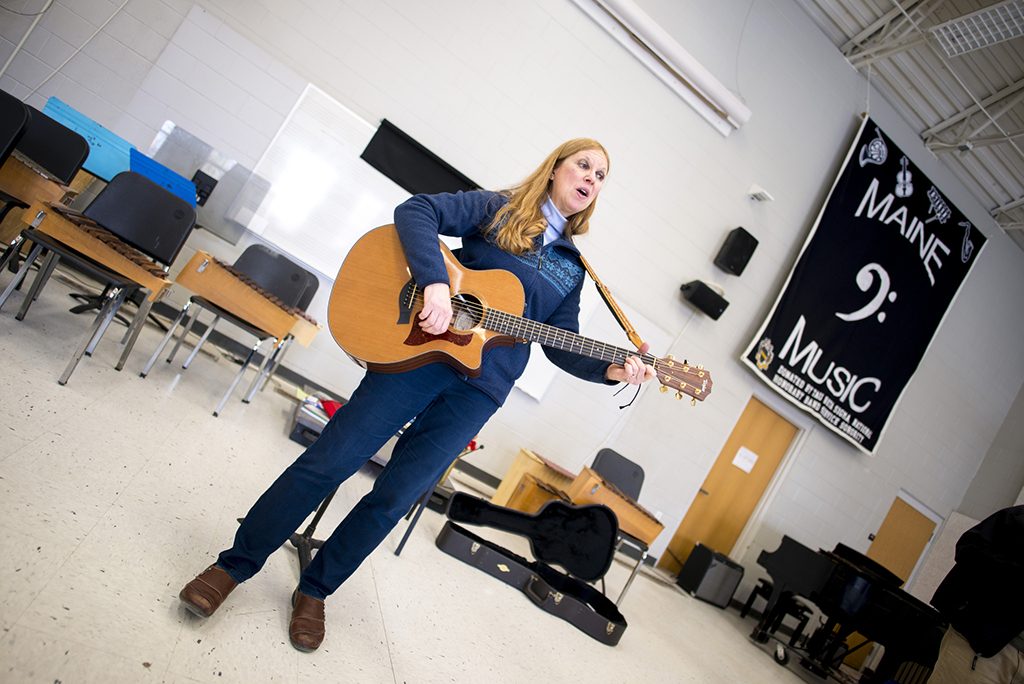Maine Schools in Focus: Music Education in Maine’s Rural Schools

Laura Artesani, Associate Professor, Division of Music
The state of Maine occupies a unique place as the most rural state in the country, according to the most recent U.S. Census (Wickenheiser, 2012). How does this impact University of Maine graduates who now hold teaching positions in our state?
A survey was recently distributed to University of Maine alumni who earned degrees in music education and are now teaching music in Maine in towns with a population of 3,000 or less. The results of the survey highlight the rewards and challenges of being a music educator in a rural area.
Survey results indicated that 87% of the respondents were satisfied with their current positions, with 3% very satisfied. Music educators in rural schools often teach the same students for several years; this may be a factor in job satisfaction. In response to the statement, “One of the rewards of my teaching position is that I teach the same students over a period of several years,” 85% of the respondents strongly agreed.
One alumnus wrote, “I love that I’ve known students for twelve years. I’ve seen them enter school in PreK and work with them straight through high school if they are in my ensembles. I also feel that parents trust me as a teacher and take my advice to heart.”
Another respondent commented, “Teaching in a small, rural school allows me to build connections with my students. I often have some idea of what student home life is like and how that impacts their time at school. I also find rural school districts very appreciative of the extra time and effort that you might put into your music program.”
Participants in the survey also reported a high level of community support. Regarding the statement, “The communities in the town(s) where I teach are supportive of the school’s music programs,” 33% of the respondents strongly agreed and 60% agreed. One respondent stated, “. . . it’s nice to go to Walmart and have a dozen people tell me how the band sounded great at the ball game. . . or when I walk across the floor after a ball game- the crowd cheers for me and the band.”
When asked, “What do you find most rewarding about teaching music in a rural area?”, one respondent answered, “The sense of community and support. The town looks forward to seeing their kids perform throughout the year.”
Although there are many benefits of teaching in rural areas, there are also obstacles to overcome. Participation in school band or orchestra programs often requires renting or purchasing an instrument, along with other expenses such as private lessons, supplies and concert attire. Economic hardship is a problem that affects many music programs in rural schools. Seventy-four percent of respondents indicated that economic hardship often (27%) or sometimes (47%) makes it difficult for students to participate in their school’s music program. One survey participant stated, “Some of my students do not have the money to rent the instrument that they need to be in band.” Another commented, “There is a large concentration of needy families in this area and the children are the unfortunate bearers of that weight.” When asked, “What is the biggest challenge of teaching music in a rural area?”, one respondent answered, “Poverty.”
In some rural towns, there is only one music educator. Survey results indicated that 57% of participants feel isolated from other music educators. As one participant wrote, “Because of the rural area, I am the one music teacher in my school and therefore teaching the grade span of K-8 can be overwhelming in terms of lesson planning, teaching styles, and setting and re-setting up my small classroom many times a day.”
According to the survey results, finding opportunities for students to experience live music is also a challenge for music educators in rural schools. Fifty percent of the participants disagreed with the statement, “In the communities where I teach, there are many opportunities for my students to hear live music of various styles, in concert venues or other settings”, and 20% strongly disagreed. In addition, 60% of the respondents indicated that guest clinicians, performers and touring ensembles rarely or never visit their schools.
How can music education degree programs support their alumni who teach in rural areas? Survey respondents shared several ideas, including: “Offer workshops for rural music teachers,” “Encourage student teachers to student teach at these schools,” and “Send performing ensembles to rural schools more often.” Participants in the survey also indicated that pre-service teachers should be prepared to repair instruments and to study both instrumental and vocal pedagogy, as “Rural teachers must be a ‘jack of all trades’”.
This survey, which had a response rate of 83%, has provided valuable information as we seek ways to support our alumni and prepare our pre-service teachers for the realities of the classroom.
I am grateful to the survey participants for sharing their thoughts, suggestions and advice as we move forward. Their responses also raise important questions, such as:
- How can in-service music education programs effectively prepare students to teach in rural communities?
- How do music education programs in rural areas provide exposure to diverse musical experiences?
- How can music education programs contribute to the culture and sense of community in rural communities?
Sources:
Wickenheiser, Matt. “Census: Maine most rural state in 2010 as urban centers grow nationwide.” Bangor Daily News, 26 March 2012.
Any opinions, conclusions, or recommendations expressed in the Maine Schools in Focus briefs are those of the authors and do not necessarily reflect institutional positions or views of the College of Education and Human Development or the University of Maine.
